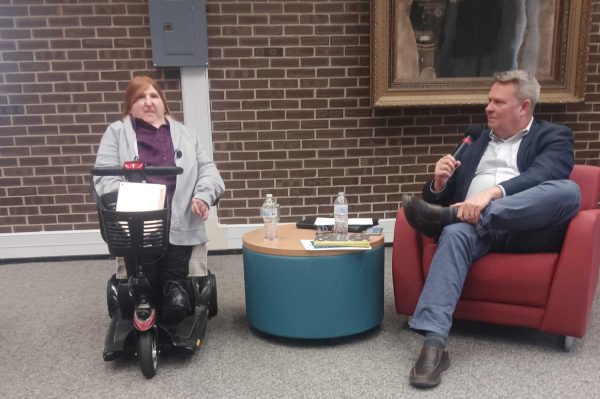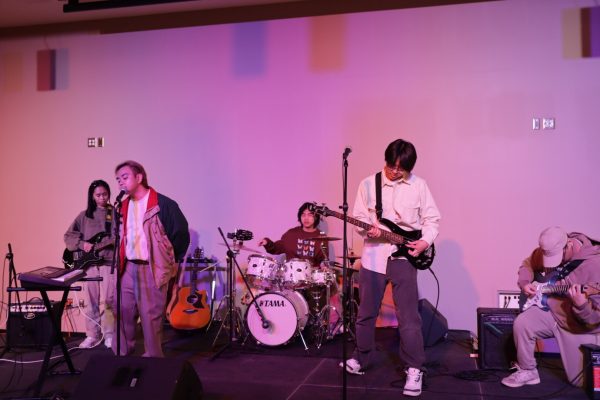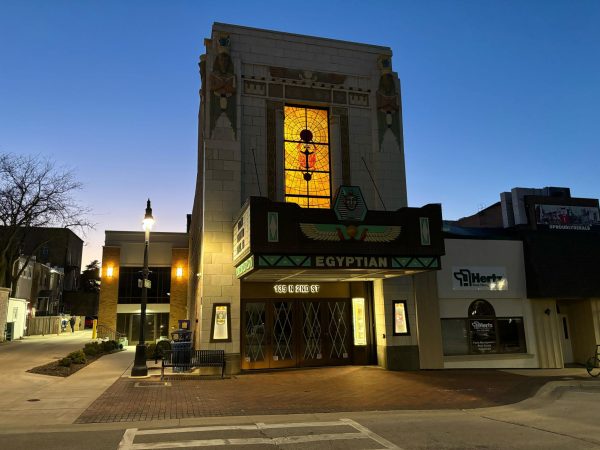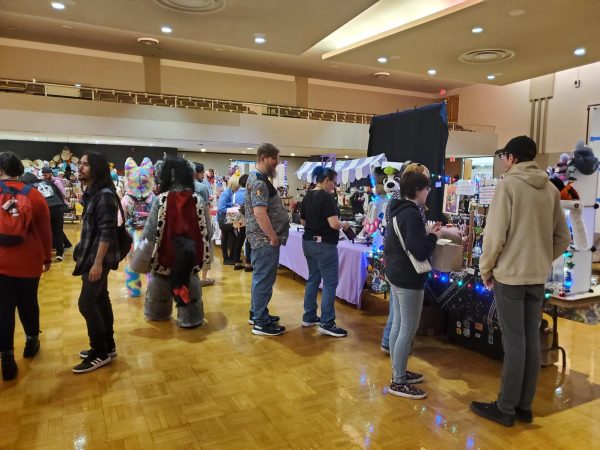Behind The Show
November 10, 2005
While most NIU students were sleeping 4 a.m. Sunday – or, at least, hopefully sleeping – 311, complete with five tour buses and three semi-trailers full of staging equipment, were traveling north on Interstate 39.
The group finished its Saturday night show at the University of Illinois Champaign-Urbana and was driving to DeKalb to play the Convocation Center Sunday night.
While most concert-goers show up to the Convo, ticket in hand, ready to sing along with their favorite artist, very few realize what goes into putting on a show.
From load-in and rigging to catering, the lack of a place to call home and all the way to load-out, the Convo can go from an empty floor to a packed house and back again in a matter of hours.
Load-In
Walking onto the Convo floor at 9:30 a.m., you’ll find the place is empty except for the stage decking provided by NIU on the west end of the floor.
The modulized sections are four feet by eight feet and are the basic stage setup for every Convo show and can be pieced together in a matter of minutes.
“We provide each show with the stage, the floor and the seating,” said Ed Dawson, operations supervisor at the Convo. “Everything else – lighting, sound, video – is provided by either the tour itself or whatever rental company we get stuff from.”
At 10 a.m., the doors to the semi-trucks fly open and cases upon cases begin the 250-foot journey up the ramp to the main floor.
The lighting rig is the first main piece of the staging to be assembled.
The rig is anchored by 12 drops which are secured on the beams of the Convo ceiling. Riggers climb to the top of the ceiling via ladders and staircases and begin dropping ropes to the floor. From there, high-tension wires are sent up, secured and motors are then attached. The motors pull the assembled lighting rig into place and the lights are tested.
“Depending on who we’re working with, sometimes the promoter or NIU will outsource the sound and lighting to various companies,” Dawson said.
Some bands go beyond just outsourcing light and sound.
“I’ve worked with bands who fly to every show,” said Rich Torine, production manager and promoter for the 311 show. “They come in with luggage and guitars, and we would have to provide everything else, even a drum kit.”
Seating for concerts is a challenge as well. Festival seating – a big, empty floor – allows Dawson and his crew one less thing to work on. General admission seating, complete with chairs, can only be set up once everything else is in place.
“Depending on the load-in time, we’ll cut down at a certain point and I’ll take those crew members and we’ll begin laying down chairs,” Dawson said.
Altogether, the stage took less than three and a half hours to set up.
“The way the stage looks, most people think it takes weeks to set up,” said Jim Carroccio, 311’s tour manager.
Local hands
About 20 NIU students are working today for the 311 show and are called “hands.” The hands help unload and load trucks, set up the lighting rig and break down equipment between sets.
“The tour will carry the minimum they need to set up the show, but to load and unload, they call in the local hands,” Torine said. “In NIU’s case, they use student help, which is great.”
Students are able to tailor working a show at the Convo around their class schedule.
“For the 3 Doors Down show, we had students here working from 8 a.m. to noon, leave for class for two hours and then come right back,” Dawson said.
Dawson makes sure the hands stick to their studies as well.
“As student workers, they are here working for the college,” Dawson said. “But classes are why they are at college and this job is just a means of making money.”
Some 311 crew members started out as hands.
“I worked local shows and was a hand at shows back home,” said 311 drum technician Bryan Manley, who’s been out with 311 for a year and a half. “I met the right person and I was offered the job.”
Production
While it may look like the production staff is working on plans and paperwork for tonight’s show, in actuality, they are working three weeks ahead of time.
The staff oversees everything from setting up its own office to making sure everyone else is on track and doing his or her task at hand.
“Most of the stuff we do in the office doesn’t have a lot to do with the show today,” Carroccio said. “We’re usually working on shows in the future.”
Daily tasks include setting up press time, printing out daily schedules, working with promoters and dealing with the daily logistics of the show.
“A week before we get here, the show is totally done,” Carroccio said.
The Convo has its production people as well.
“For today’s show, I’m the direct line between 311’s production manager and the building,” Dawson said. “If the tour manager needs something, he’s going to ask me for it.”
Catering
“Hey Bryan, you want a breakfast burrito?” tour chef Terry Shapiro yells from the stage while the crew rigs the lighting behind him.
“Yeah,” shouts back Manley.
Walking around the Convo floor during load-in, Shapiro finds out who wants breakfast.
Shapiro and chef Micky McFall, tour caterers who have been out on tour with 311 for several years, cook three meals a day for the crew and band. The menu changes every day.
“We see the same people every day, so we have to change what we make,” Shapiro said.
On Sunday’s menu, lunch included turkey and veggies wraps, and bratwurst and chicken cordon-bleu alongside salads and desserts.
“If load-in is at 10 a.m., I go out an hour early, find a supermarket and buy everything I’ll need for the day,” McFall said.
On average, the duo cooks for about 50 to 60 people on smaller tours and between 80 and 100 on larger, summer tours. The two work an average of 12 hours a day now, but said they work up to 16-hour days during the summer months.
“Everything is fresh,” Shapiro said. “We buy fresh meats every day and change up things as much as possible.”
The duo not only work together, they also have their own business called “The Evidence was Eaten” and have toured with Neil Diamond, Nirvana, Bruce Springsteen and Yanni.
Don’t call them roadies
While the typical term for anyone associated with the band that’s not actually in the band is “roadie,” crew members are quick to correct you when you utter the faux pas.
“We don’t call them roadies anymore, we call them techs,” Carroccio said.
The image of a roadie is synonymous with a dumb lug, Carroccio said.
“Some of my guys can tear apart a guitar or amp and put it back together in the time it takes the band to play one song,” Carroccio said. “That’s not what I would call a dumb lug.”
Some of the crew members make up to $3,500 a week being on tour and putting their skills to use every day.
So next time you want to talk to a crew member, remember: they are just as talented as you and deserve respect as well.
Home sweet home
“Being away from home is probably the most difficult part of the job,” Carroccio said.
Traveling from city to city, the crew sees new sights each day.
“Even though it’s the same, it’s different every day,” Manley said. “Different location, different surroundings. Something’s going to be different every day.”
On average, the crew is out for about two months at a time, with several weeks or months off in between tours.
“Some guys will just [go] out from gig to gig and be out for a full year,” Manley said.
With being surrounded by the same people day in and day out, the feeling of being with a family plays heavily on the crew.
“This is completely a family,” Manley said. “You see these guys more than everyone else. You live with them, you work with them.”
Some like to stay in one place, though.
“I’ve been asked to go out on the road,” Dawson said. “But I don’t think I could. I don’t think I would have the patience to do this night after night in a different city.”
Load-out
“You think setting up is fast, wait until the end of the night,” Carroccio said. “This place will be empty in an hour and a half.”
Indeed it was.
After 311 left the stage, crew members began emptying the stage as fast as possible, packing cases and loading the three semi-trucks. The Sunday night ride was a four-hour trip to West Lafayette, Ind. for a day off on Monday and a Tuesday show at Purdue University.
The Convo has a long night ahead of it as well.
“After the show, my crew has to take down a stage, set up a basketball court and move some seating for the Tuesday basketball game,” Dawson said.
By the time tip-off took place Tuesday night, the 311 stage and crew were in an entirely different city, planning three weeks ahead and eating a home-cooked meal in the recesses of another arena.











